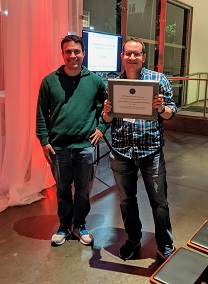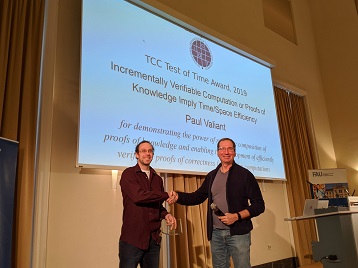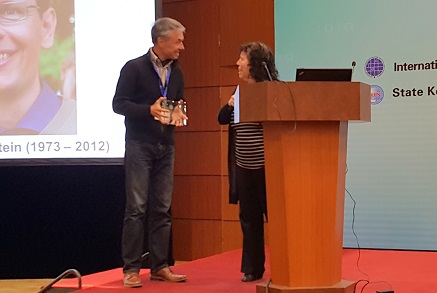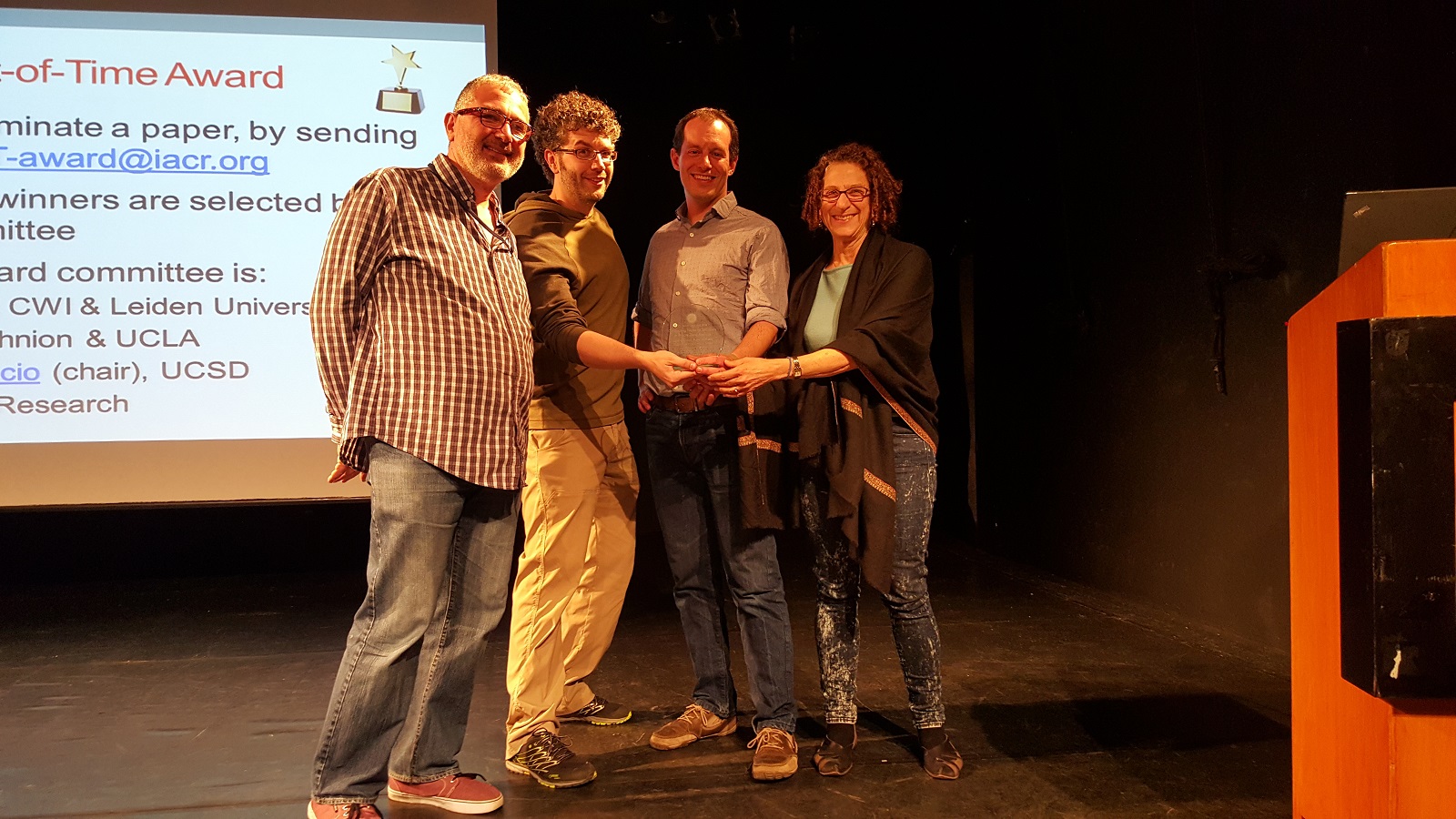TCC Test-of-Time Award
The TCC Test of Time Award recognizes outstanding papers, published in TCC at least eight years ago, making a significant contribution to the theory of cryptography, preferably with influence also in other areas of cryptography, theory, and beyond. The inaugural TCC Test of Time Award was given in TCC 2015 for papers published no later than TCC 2007.
Award Recipients
2021:-
 Keyword Search and Oblivious Pseudorandom Functions by
Michael J. Freedman,
Yuval Ishai,
Benny Pinkas,
Omer Reingold, published in TCC 2005,
for introducing and formalizing the notion of Oblivious Pseudorandom Functions, and identifying connections to other primitives such as keyword search, inspiring a vast amount of theoretical and practical work
Keyword Search and Oblivious Pseudorandom Functions by
Michael J. Freedman,
Yuval Ishai,
Benny Pinkas,
Omer Reingold, published in TCC 2005,
for introducing and formalizing the notion of Oblivious Pseudorandom Functions, and identifying connections to other primitives such as keyword search, inspiring a vast amount of theoretical and practical work
- Perfectly-Secure MPC with Linear Communication Complexity by Zuzana Trubini and Martin Hirt, published in TCC 2008, for introducing hyper-invertible matrices to perfectly secure multiparty computation, thus enabling significant efficiency improvements and, eventually, constructions with minimal communication complexity.
-
 Incrementally Verifiable Computation or Proofs of Knowledge Imply Time/Space Efficiency by
Paul Valiant,
published in TCC 2008, for demonstrating the power of recursive composition of proofs of knowledge and enabling the development of efficiently verifiable proofs of correctness for complex computations.
Incrementally Verifiable Computation or Proofs of Knowledge Imply Time/Space Efficiency by
Paul Valiant,
published in TCC 2008, for demonstrating the power of recursive composition of proofs of knowledge and enabling the development of efficiently verifiable proofs of correctness for complex computations.
- Evaluating 2-DNF Formulas on Ciphertexts by Dan Boneh, Eu-Jin Goh, and Kobbi Nissim, published in TCC 2005, for introducing compact two-operation homomorphic encryption and developing new bilinear map techniques that led to major improvements in the design of cryptographic schemes.
-
 Efficient Collision-Resistant Hashing from Worst-Case Assumptions on Cyclic Lattices by
Chris Peikert (U. Michigan) and Alon Rosen (IDC Herzlia),
published in TCC 2006, for advancing the use of hard algebraic lattice problems in cryptography, paving the way for major theoretical and practical advances.
Efficient Collision-Resistant Hashing from Worst-Case Assumptions on Cyclic Lattices by
Chris Peikert (U. Michigan) and Alon Rosen (IDC Herzlia),
published in TCC 2006, for advancing the use of hard algebraic lattice problems in cryptography, paving the way for major theoretical and practical advances.
-
 Indifferentiability, Impossibility Results on Reductions, and Applications to the Random Oracle Methodology by Ueli Maurer (ETH), Renato Renner (ETH) and Clemens Holenstein,
published in TCC 2004, for introducing the security notion of "indifferentiability", that had a significant impact on both the theory of cryptography and the design of practical cryptosystems.
Indifferentiability, Impossibility Results on Reductions, and Applications to the Random Oracle Methodology by Ueli Maurer (ETH), Renato Renner (ETH) and Clemens Holenstein,
published in TCC 2004, for introducing the security notion of "indifferentiability", that had a significant impact on both the theory of cryptography and the design of practical cryptosystems.
-
 Calibrating Noise to Sensitivity in Private Data Analysis by
Cynthia Dwork (Microsoft Research), Frank McSherry, Kobbi Nissim (Ben-Gurion University), and Adam Smith (Penn State), which was published in TCC 2006, for introducing the definition of differential privacy, and providing a solid mathematical foundation for a vast body of subsequent work on private data analysis.
Calibrating Noise to Sensitivity in Private Data Analysis by
Cynthia Dwork (Microsoft Research), Frank McSherry, Kobbi Nissim (Ben-Gurion University), and Adam Smith (Penn State), which was published in TCC 2006, for introducing the definition of differential privacy, and providing a solid mathematical foundation for a vast body of subsequent work on private data analysis.
- Physically Observable Cryptography by Silvio Micali (MIT) and Leonid Reyzin (Boston University), which was published in TCC 2004, for pioneering a mathematical foundation of cryptography in the presence of information leakage in physical systems.
Award Rules
The award is given annually during the TCC conference. Recipients of the award are selected by a committee consisting of three members. The Award Committee is expected to select 1-2 papers each year. The committees' membership is rotating, with each member serving three years. Currently, the award committee consists of- Ran Canetti, Boston University (2022-2024)
- Alon Rosen, IDC Herzliah (2021-2023)
- Hugo Krawczyk, Algorand Foundation (2020-2022)
Anyone can nominate a paper for the test-of-time award by sending email to the award committee at [email protected]. A nomination should include the title, authors, and year that the paper was published, and a statement describing the contributions of the work and the reason why it is worthy of the award. The award committee can also self-nominate papers, i.e. consider papers that were nominated by members of the committee itself. Papers authored or co-authored by current members of the award committee are not eligible to receive the award that year.
Past members of the award committee
- Ivan Damgård, Aarhus University (2019-2021)
- Leonid Reyzin, Boston University (2018-2020)
- Shafi Goldwasser, MIT & Weizmann Inst. (2017-2019)
- Jesper Buus Nielsen, Aarhus University (2016-2018)
- Yuval Ishai, Technion, Israel (2015-2017)
- Ronald Cramer, CWI Amsterdam (2014-2016)
- Daniele Micciancio, UCSD (2014-2016)
- Tal Rabin, IBM Research (2014-2016)